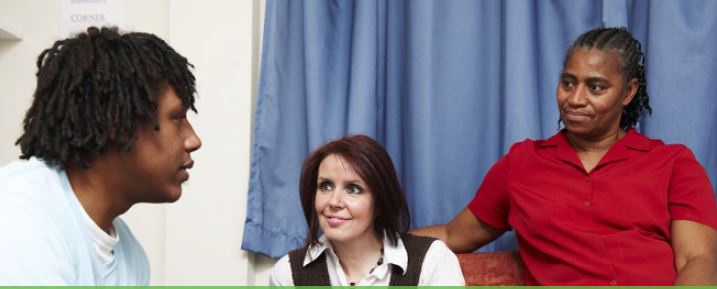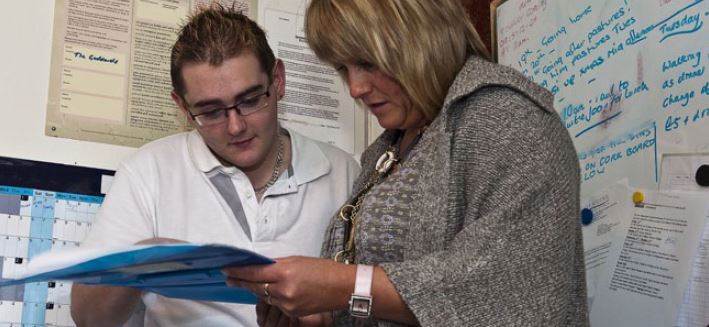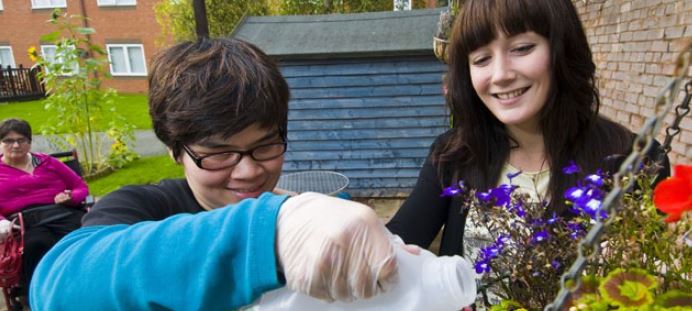
“We found many people have been in assessment and treatment services for disproportionate periods of time, with no clear plans for discharge arrangements in place, and too many people were in services away from their families and home.”
(Care Quality Commission, 2012)
We were very aware through our voluntary and consultancy roles, that close relatives of people admitted to in-patient services often felt poorly informed and confused. They were unsure about what questions to ask, what they should be able to expect and the options, and were unclear about their relative’s rights and responsibilities, as well as their own.,
Following the ‘Winterbourne View’ scandal, official reports acknowledged that in-patient admission for assessment and treatment might continue to be appropriate for some people with learning disabilities, but smaller numbers than in the past. The Concordat (Department of Health, 2012) signed by all the relevant statutory bodies committed them to improving information for people with learning disabilities and their families and to involving them in planning and quality improvement of services.
Family members have such important roles to play in their relationship with services: contributing their expertise, monitoring what’s happening to their relatives, safeguarding their rights and pushing for the best possible outcomes, including well-planned discharge. They can be most effective if they are well prepared, especially if staff are not well informed about the Mental Health Act and the Mental Capacity Act (and how these interact) or about people with learning disabilities. With complex legalities, involvement of multiple professionals and services, and possible power issues, family members need all the guidance they can get.
There appeared to be a gap in information specifically for families of people with learning disabilities, so we were delighted that NHS London (as it then was) funded the development of this new resource.

Family carers have such important roles to play in their relationship with services and can be most effective if they are well prepared
How we did it
We brought together a group of family members whose relatives had spent time as in-patients in assessment and treatment services, listened to their stories and worked with them during two meetings to draw out:
- the most important types of information for families (‘what you wish you’d known’)
- what families ought to be able to expect (‘what does good look like’)
- advice about how to present information for other families
- key messages (‘read this page if nothing else’).
We also reviewed a range of information and guidance already available about in-patient care and distilled information relevant to people with learning disabilities and their families. We shared ideas for the information booklet with the family members group as we started drafting, getting comments from them and others with relevant expertise who had agreed to be ‘critical readers’.
We also kept in touch with similar work under way with a group of people with learning disabilities, and discussed whether it would be possible to agree and produce a single set of expectations or standards. This was not pursued because family members were clear they wanted more detailed information than could readily be presented in an easy read format. There was already a tension between the desire for concise information that families in crisis situations could absorb quickly versus the wish for comprehensive detail.
As is often the case, the work needed to be completed to a tight timetable. We would have liked longer to explore the possibility of meeting the information needs of people with learning disabilities and family members through one publication. We would also have liked to be able to test drafts with more people (both a larger number and a wider range).
There were delays in publication related to changes in the NHS structures and inevitably there have been developments since we submitted the final draft – more useful resources have been published and new laws and regulations have been introduced. These do not detract from the information and advice contained in the booklet, but do illustrate the need for regular updates to all information resources.
What’s in the guide
The booklet provides:
- information: about admissions, different types of services, rights and responsibilities, being involved, and planning for discharge
- a picture of what families should be able to expect – standards that services should achieve
- suggestions for questions to ask, things to do
- links to useful organisations and further information.
There is a page of ‘key messages’, points that members of the families group said were really important. Even if a family member did not have time to look at other sections of the booklet, this page would give them some immediate suggestions. For example:
- try to get good assessment and treatment for the person at home first, to avoid them having to go into hospital;
- create a positive relationship with the hospital team: give them information based on your knowledge of your relative and listen to their advice too
- don’t make assumptions about what is happening: ask questions
- keep in touch with your relative and encourage others to do the same.
Concluding comments
NHS England has printed 10,000 copies for distribution to family carers across England. We know that getting information to people at the time they need it is very important, so we hope that staff who work with people with learning disabilities and their families will also give the booklet to families whose relative is being admitted, or might be admitted. We also hope that the booklet will give commissioners and staff in services insights into what family carers want and need, and will encourage positive engagement with families.
We believe strongly that better informed families can help to improve service delivery and planning, both for their own relatives and for others in their communities. The booklet should help family members find their way through the service maze, help ensure their relatives are safe, and that there is active planning to achieve the best possible support for their loved ones back in the community. We hope that this booklet will help to achieve that.
Link
Getting it right for people with learning disabilities. Going into hospital because of mental health difficulties or challenging behaviours: What families need to know, Angela Cole and Alison Giraud-Saunders for NHS England
References
Care Quality Commission (2012) Learning disability services inspection programme: National overview. Newcastle upon Tyne: Care Quality Commission
Department of Health (2012) DH Winterbourne View Review. Concordat: Programme of Action. London: Department of Health



RT @LearningDisElf: Equipping family carers with better information about in-patient assessment and treatment for people with learnin… ht…
Samantha Tomlinson liked this on Facebook.
Debut blog from Alison Giraud-Saunders on helping family carers of people with learning disabilities http://t.co/ekkmlMiBOJ
Better information for family carers about in-patient assessment and treatment for people with learning disabilities http://t.co/G8aNRbFX9p
Equipping family carers with better information about in-patient assessment & treatment for people with ld’s http://t.co/wRkYcIN6ja
Hampshire Healthcare Library Service liked this on Facebook.
Going into hospital because of mental health difficulties or challenging behaviours: What families need to know http://t.co/ekkmlMiBOJ
Read Alison Giraud-Saunders’ blog on her @NHSEngland report for family carers of people with learning disabilities http://t.co/ekkmlMiBOJ
Better informed families can help to improve service delivery and planning http://t.co/ekkmlMiBOJ
Linda Crossey liked this on Facebook.
Equipping family carers with better information about in-patient assessment and treatment…. http://t.co/oRGnlWyS6f via @LearningDisElf
Don’t miss: Equipping family carers with better information about in-patient assessment and treatment http://t.co/ekkmlMiBOJ
Allison Whalley liked this on Facebook.
Better informed families help improve services for adults with LD. this guide helps. Don’t miss Alison G.S’s blog http://t.co/jiNkZaSnVx
RT “@LearningDisElf: Better informed families help improve services for adults with LD. Don’t miss Alison G.S’s blog http://t.co/fIzWoHP1H3”
Lindsey Ambrose liked this on Facebook.
Equipping family carers with better information about in-patient assessment and treatment – http://t.co/ff3oj6Crx7
Equipping family carers with better info about in-patient A&T for people with LD -The Learning Disabilities Elf http://t.co/Y3UNApZgXU